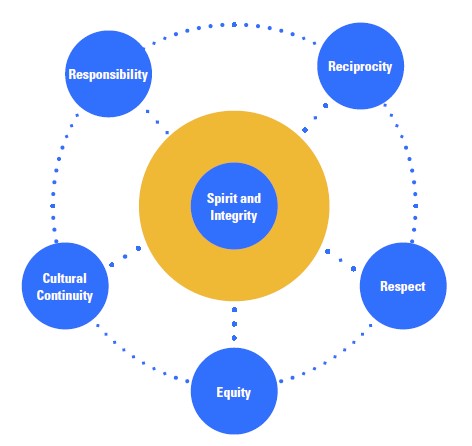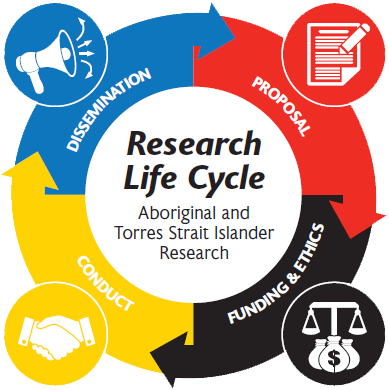If you are thinking about conducting a research project with Aboriginal and Torres Strait Islander peoples or communities, the design of your project must respect and take into account the values, and cultural protocols of Aboriginal and Torres Strait Islander peoples. As such there are additional considerations for research projects that:
- Involve or will be conducted in or with Aboriginal and Torres Strait Islander communities
- Uses data related to Aboriginal and Torres Strait Islander peoples that is not otherwise publically available
- Targets participants who are Aboriginal and Torres Strait Islander people/s
- The recruitment population is likely to include a significant number of Aboriginal and Torres Strait Islander peoples, i.e. health population studies, certain school populations
Research life cycle
- Read and understand: Ethical Conduct in research with Aboriginal and Torres Strait Islander Peoples and communities
- Determine whether the project constitutes community engagement or research, or both. Seek advice from Riawunna on community relationship building
- Consider how you will build a respectful, culturally and historically aware relationship with the community
- Determine how you will include Aboriginal and Torres Strait Islander perspectives and governance into the project
- Apply for funding such as NHMRC fundingfor Indigenous research and researchers
- Consult an Aboriginal and Torres Strait Islander Ethics Advisor on the research plan and ethics application
- Complete your research ethics application in ERM. Please refer to Chpt 4.7 of the National Statement on Ethical Conduct in Human Research 2023 and address the six core values identified as being important to Aboriginal and Torres Strait Islander Peoples in your application
- Seek ethics approval through the appropriate Human Research Ethics Committee
- Adhere to Ethical Conduct, theAustralian Code, and the NationalStatement
- Adhere to ethics approval, including reporting requirements
- Adhere to any funding requirements
- Adhere to any agreements with Aboriginal and Torres Strait Islander people or communities
- Review local and national data sharing guidelines and ensure compliance
- Ensure Indigenous data confidentiality by only sharing and reporting data within the conditions of informed consent
- Ensure Aboriginal and Torres Strait Islander people and/or communities receive results of the project
Guidelines for adhering to ethical conduct
The National Health and Medical Research Council (NHMRC) Ethical conduct in research with Aboriginal and Torres Strait Islander Peoples and communities: Guidelines for researchers and stakeholders (2018) provides researchers with guidance in the conception, design, and conduct of research. This document outlines six key values that demonstrates that ethical research with Aboriginal and Torres Strait Islander people and communities requires more than adherence to the legal requirements of guidelines. All research projects must incorporate these six values, and researchers should also be aware of any Western research norms or assumptions that may unintentionally lead to culturally insensitive research practices.
Ethical research is founded on Aboriginal and Torres Strait Islander cultural value systems. Accordingly, unethical research behaviour can arise from the failure to recognise Aboriginal and Torres Strait Islander value systems. Unethical research behaviour can also arise from the prioritising of the researchers’ own value system over Aboriginal and Torres Strait Islander cultural value systems. Either practice reduces research validity and causes real life harm to the Aboriginal and Torres Strait Islander people.
The Guidance for the Six Values Table provides a description of the key aspects of each of the six values, accompanied by a set of positive research practice examples linked to the achievement of each value within research. Box 1 in the PDF includes problematic research practice that have been shown to increase the likelihood that a research project will not meet ethical guidelines.
Research projects vary in purpose, design, data source/type and analytical processes. The positive research practices linked to the descriptions of the six values of the NHMRC in the PDF below therefore are not going to be applicable to all research projects. The intent in guidance provided in the PDF is not to set hard rules, but to provide examples of high quality practices and processes.

Six values
- Spirit and Integrity
- Reciprocity
- Respect
- Equity
- Responsibility
- Cultural Continuity
The figure shows how these values combine to form a holistic approach to Aboriginal and Torres Strait Islander related research.
Diagram 1 from Ethical conduct in research with Aboriginal and Torres Strait Islander Peoples and communities: Guidelines for researchers and stakeholders (2018), pg 3.
Note: The terms Aboriginal, Aboriginal and Torres Strait Islander and Indigenous are used alternately. Aboriginal reflects that most Indigenous people in Tasmania are Tasmanian Aborigines. Indigenous and Aboriginal and Torres Strait Islander reflects the welcome presence of other Indigenous people at the University.
Aboriginal and Torres Strait Islander involvement in the Research
When the views and cultural, values, beliefs and practices of researchers and participants differ there is potential for miscommunication, misunderstanding and breach of cultural protocols. For this reason it is strongly recommended that Aboriginal and Torres Strait Islander research always has significant Aboriginal and Torres Strait Islander input into the research design and the processes of the research project.
Aboriginal and Torres Strait Islander research that does not include substantial Aboriginal and Torres Strait Islander research and/or governance involvement would need to provide a valid explanation for the absence in the project’s ethics application. As a caution it needs to be noted that Aboriginal and Torres Strait Islander inclusion does not negate the responsibilities of the non-Indigenous researchers to be culturally competent and responsible for their own cultural/protocol learnings. Researchers cannot abrogate responsibility for ensuring their own cultural competence or for producing culturally responsible and culturally sensitive and safe research by the mere inclusion of Aboriginal and Torres Strait Islander people in the research team.
Common ways that Aboriginal and Torres Strait Islander involvement is demonstrated are listed below. Good ethical research practice may include a number of these.
The primary way that researchers can demonstrate Aboriginal and Torres Strait Islander involvement is via the inclusion of Aboriginal and Torres Strait Islander researchers as Investigators.
An Aboriginal and Torres Strait Islander Governance and Reference Group is a group of Aboriginal and Torres Strait Islander people with expertise in aspects of the research topic, especially the cultural aspects. This group is expected to have formalised decision-making input into all aspects of the research process inclusive of the research plan, methodology, ethical conduct, interpretation and dissemination of results and have that input acknowledged (with their express permission) in any research output. Members of the governance/reference group will have a general understanding of the world views and cultural values and beliefs of the participants and the researchers. Members may include Elders, community members and members who have an understanding and expertise in the specific discipline or profession in relation to the research. Most often members of a governance/reference group are drawn from the community that are the subject of the research.
Where neither the Aboriginal and Torres Strait Islander nor non-Indigenous researchers possess the necessary deep cultural and historical understandings, consideration should be given to the employment of a Cultural Broker or Cultural Mentor. Dependent on the level of work involved the person or persons in these roles would need to be financially compensated for their work.
The roles of Cultural Broker and Cultural Mentor may overlap with one person carrying out both roles. If the Cultural Broker or Cultural Mentor is playing a significant role in the project, for example recruiting participants, negotiating and drafting research agreements, collecting data or acting as a language interpreter, then this person should also be named as a co-investigator on the project.
A Cultural Broker is someone who can facilitate the interaction between a person or group of people from one culture to another. A Cultural Broker can play a crucial role at the start of the research process bridging the cultural divide to facilitate a smooth introduction and interaction between the researcher and the Aboriginal and Torres Strait Islander community. The Cultural Broker can also be involved throughout the research process especially if there is need for re-negotiation or mediation. A Cultural Broker would usually be an Aboriginal and Torres Strait Islander person who has an understanding of the world views and cultural values, beliefs and practices of both parties.
A Cultural Mentor is someone who can inform the research of local customs and norms providing advice about world views and cultural values, beliefs and practices and associated protocols which need to be followed. The Cultural Mentor would not normally have contact with the Aboriginal and Torres Strait Islander group or community throughout the research process. A cultural mentor would usually be an Aboriginal and Torres Strait Islander person from the participant group or community.
When planning the study you must ensure that the roles and responsibilities of the members of the research team are appropriate and defined, for example, ensure that:
- Clearly defined responsibilities and level of involvement of all parties is documented and signed off by all parties;
- The Chief Investigator, Cultural Broker, Cultural Mentor or Reference group are consulted about relevant world views, cultural values, beliefs and protocols in the development of the research proposal;
- There is appropriate payment and/or workload recognition and acknowledgement in reports, presentations and publications of those involved in the project; and,
- Regular meetings are scheduled, held, and minuted.
Community engagement
For community engagement projects, always discuss your community engagement plans with the Riawunna Centre for Aboriginal Education. Riawunna staff can provide advice to researchers on how community relationships might be developed and the most appropriate organisational contacts.
Note: It is not the role of Riawunna staff to broker relationships with community groups or organisations on behalf of researchers or those undertaking community engagement projects. Initiation and building of relationships must always remain the responsibility of those undertaking the community engagement or research project.
Indigenous data sovereignty
Indigenous data sovereignty, in keeping with the six values, requires that data related to Indigenous peoples should be subject to the laws/governance of those peoples. Indigenous data sovereignty:
- Asserts Indigenous rights and interests in relation to data
- Ensures Indigenous data are safeguarded and protected
- Ensures quality/integrity of Indigenous data and collection
- Advocates for Indigenous involvement in governance of data repositories
- Asserts Indigenous rights in relation to decisions about collection of, and access to, Indigenous data
Indigenous data sovereignty applies to projects that use data relating to and about Aboriginal and Torres Strait Islander people/s. When using secondary data in research it is essential that Indigenous data sovereignty is protected by maintaining the consent requirements and restrictions placed on the data when it was originally collected.
Go to more information about Indigenous data sovereignty in Australia, including key principles at MnW Principles — Maiam Nayri Wingara.
